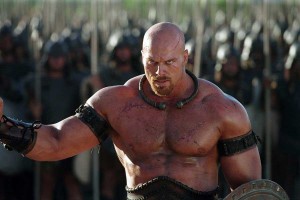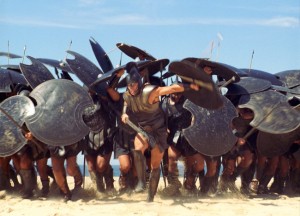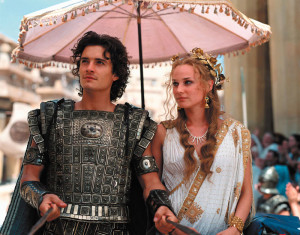I know what you are thinking, “Why in the world would you review Troy when there are so many other movies? I mean, come on.” It is true. Compared to fantasy films of the 1980’s, or even films of the same time, Troy has not had the time to marinate in the cultural crock pot. While my previous metaphor of a crock pot was silly and absurd the fact remains that Troy may be too new to have any real importance. In fact, the film’s 10th anniversary is approaching so I thought it would be interesting to re-evaluate the film and its role on epic filmmaking. What? Really? This film? The one with Brad Pitt and Orlando Bloom?
If one was somehow absent during the mid 2000’s, Troy depicts the story of the Trojan War as recounted by classical works such as the Iliad, the Epic Cycle, and The Aeneid. Troy was directed by Wolfgang Peterson, whose vision birthed films like Das Boot into cinematic history and others like In the Line of Fire and Outbreak, as ones barely remembered. Troy came between Peterson’s late career disaster movies The Perfect Storm in 2000 and Poseidon in 2006. While Troy is a little bit down the list of ‘most expensive films ever made,’ its grandiosity and set pieces are something of note, which are to this day somewhat dazzling. From what I can surmise, Troy’s legacy encapsulates a time when big budget films were all the rage and you were not doing it right unless you did everything imaginable.

So the opening fight with Boagrius never occurred in Greek Texts which leads me wonder why they didn’t give this guy a badass name like The Defiler or The Hornless Minotaur.
Okay, time for a history lesson. Well, sort of. The Trojan War was a conflict between the nation of Greece and the nation of Troy, which is modern day Turkey. The conflict was started after Helen of Sparta was taken by Paris of Troy to be his new wife. Well, sort of. The war served as a major event in Greek mythology as most accounts of it are mired in legend, with major deities playing decisive roles in the outcome of events. Stop fucking around with the humans, sheesh. Troy, the film, took an interesting angle by leaving all of that godly nonsense out. No. Troy wanted to present the facts of the Trojan War in the most sober way possible. Well, sort of.
Hector, played by Eric Bana and Paris, played by Orlando Bloom, are sent to Sparta to negotiate a deal that would end a long, bloody feud between Sparta and Troy. Sounds good. Things get fucked up when Paris absconds with the Spartan kings’ wife, making him look like the weakest ass for all of time. The Spartan king seeks the help of his brother Agamemnon, played by Brian Cox, in helping him win back his pride while advancing Agamemnon’s rule. People may recognize Agamemnon as the center of a trilogy of tragedies that see terrible things befall his family following this war. Agamemnon has his own personal warrior Achilles, played by Brad Pitt, who is really just a big whiny kid who knows how to kill really well. This is sort of not fair as his mother was a sea nymph and daughter to some obscure sea god. Achilles is sort of a sleeper demigod with the weight of the world upon his chiseled back.
Watching Troy ten years later reveals how the careers of the major players has panned out. Brad Pitt’s role came ten years after his breakout success in Interview with the Vampire and stands at the beginning of ten more years of success. Orlando Bloom was also experiencing massive stardom after just appearing three years earlier with the first Lord of the Rings trilogy followed by the first of 20 Pirates of the Caribbean films. Take these two stars and compare them to, Diane Kruger, playing Helen, whose career slowly unraveled into television in the next decade. Add to this the odd angles of Sean Bean, Brian Cox, and Eric Bana and one has an ensemble film with a cast of people either coming or going. The prescience now of seeing who would survive the 00’s and who would not make it out is perhaps as entertaining as people fighting with shields.
Troy mostly centers around the bruising exploits of Achilles, who is trying to find himself in the hell of war. I am wondering if the character of Achilles inspired all of the wartime cliches or Troy just decided to make Achilles sort of similar to Captain Benjamin L. Willard in Apocalypse Now. What is known is that Achilles is a great fighter, when he wants to be, and literally allows armies of his fellow countrymen to get slaughtered because him and Agamemnon are squabbling. Achilles’ immortality is not discussed, yet his famous heel will be the point of his fall. On the other side of Helms Deep is Paris, who has shown himself to be the weakest person next to the guy whose wife he stole. Helen is no better, as this little love plan has fucked everything up and no one seems to be very happy with the decision. Maybe there should be gods here. Someone needs show a little courage and be a real man or woman in this story.
The main conflict in Troy comes between Hector and Achilles, who are at loggerheads because they are great warriors. Hector, while having less power than Achilles has a family and reasons not to mope like a sad sort who just got dumped on prom night. Achilles is indifferent to this whole thing until his dumbass “cousin” Patroclus gets killed when impersonating him in battle. What in the fuck did you think was going to happen? Achilles rages (understandably if the film allowed them to be lovers as some history has suggested) and then drags the corpse of Hector around the battlefield after besting him for all of Troy to see. I am sure this whole thing won’t end badly for Achilles — here or in the afterlife.
In terms of cinematic entertainment. Troy holds up surprisingly well for many reasons. First of all, ten years in terms of CGI is enough time to make things look weird, ragged, and rough. The special effects for Troy, from the crowd renderings to the world construction, are still believable and possibly breathtaking. Add to this a focused attention paid to combat fighting and one has a recipe for an engaging war film. The choice to leave gods out of it and let humans act like shitty assholes was the right choice as deities do not need to be around for everything to go completely wrong. With that said, Troy is not without its flaws. The soundtrack was a famous blunder, with composer Gabriel Yared’s version being rejected for being too “old fashioned.” A replacement soundtrack found James Horner, composer for Titanic, recycling much of Yared’s score into the Persian canter version, which ironically does not stand the test of time.
Troy’s attention to both obvious and obscured parts of history is noteworthy. With references and teases to both The Odyssey and The Aeneid, the film makes Greek history buffs chuckle silently in their seats. The film concludes with the Greeks tricking the dumb Trojans by crafting a big wooden idol and sitting there definitely not getting burned like any sane ruler would actually do. Look at this object large enough to hold 20 men, better take it inside and leave it unattended? Think about it? Fuck that. Troy ends with the sacking of Troy and Achilles searching for a girl whom he fell in love with. Does it matter who she is? Not really. The film’s ending veers off historical tracks with the death of Agamemnon by the hands of Achilles’ love interest. But, what about the Orestes plays? Come on. Achilles gets an arrow in the heel, pays for his violence against Hector via Paris, and falls a great hero, while Paris and Helen, who did nothing, get to live. Assholes.
Troy was a massive film event when it was released. It rode a wave of epic style films that dominated the box office in the early 2000’s. The film unabashedly leaves room for a sequel but nothing followed its close. Since 2008, a sequel depicting the exploits of Odysseus has been discussed, but is to be set in space. Not even fucking joking. Revisiting Troy shows a bit of the history of epic fantasy film making as well as what audiences found appealing 10 years ago. Not much has changed, yet watching Troy again reveals a nostalgia for the style of films that pulled out every single stop to present the grandiose.
Tags: Film Review, Hollywood Metal, Kaptain Carbon, TroyCategorised in: Film



